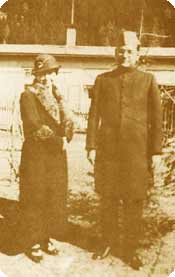Shyam Benegal's Netaji

There is a controversy brewing around Shyam Benegal's new film on Netaji, Subhas Chandra Bose: The Forgotten Hero. A group of researchers have filed suit against the film, because they dispute whether Bose was in fact married to an Austrian woman he met in the 1930s, named Emilie Schenkl. Their primary evidence seems to be that Bose checked "single" when applying for a visa to visit China in 1939. But they overlook the fact that Bose apparently traveled widely under false names, including "Ziauddin," when in Afghanistan, and "Count Orlando Mazzota" (an Italian nobleman), when in Moscow! There are also 162 love letters Bose wrote to Schenkl as documentary evidence of the depth of the relationship -- though these are being questioned by the researchers.
Emilie Schenkl claimed that she had married Bose in 1937, in a secret ceremony in Vienna. She also had a child by Bose, whose name after marriage became Anita Pfaff. Anita Pfaff, now an Economics professor in Austria, also continues to claim Bose as her father.
I obviously don't know anything more than what Rediff tells me here. What is clear that Benegal isn't getting this out of nowhere, and it's also clear that there's a strong nativist emotional charge behind the drive to keep Bose's image free from the "contaminant" of a non-Indian wife.
Though obviously documentary evidence needs to be checked and cross-referenced, I think people need to get over this need to turn Netaji into the symbol of "authentic" nativist rebellion. He was a very skilled organizer and undoubtedly a charismatic leader, but he did spend a fair amount of time in Europe, and he did have some western education. Also, even before Bose went abroad, he attended Presidency College in Calcutta, one of the most elite (read: most Anglicized) institutions in the British Raj. Bose was, in short, no different in constitution from the Congress leaders of the day. And he was not a saint: as everyone knows, Bose went to Adolf Hitler for support for a military solution to British colonialism. His Indian National Army then fought with the Japanese against Anglo-Indian forces in Burma, 1943-1945. The Japanese said they were fighting to liberate people of color from colonialism, but they weren't exactly credible on this, even then.
The question of whether Subhas Chandra Bose married an Austrian woman is a relatively small thing, considering that he was most definitely sleeping with the devil militarily. After everything, it's his personal life that seems to matter most to people.
As a side-note, the film is getting good reviews, and has a soundtrack by A.R. Rahman as a plus; I'll probably go and see it.


6 Comments:
Amardeep, I'd be interested in your take on Bose the movie. I was rather dissapointed by it, I think, partially because I grew up with this myth of Netaji in Kolkata. Bose comes across as a person who is rather naive about global politics and not particularly savvy about the ways of the world. In particular the "great escape"-- his attempt to get asylum in first Russia then Germany then Italy is almost comic. In one scene he lectures Hitler on military strategy. I wonder if this is true or is Benegal taking liberties to imagine this exchange.
The film is also much longer than it needs to be (3 1/2 hours almost).
Amardeep,
The marriage is not just a claim. It is pretty well documented, and I recollect seeing a photo of Bose and his wife as well. I find the forward bloc's suit objectionable, given that Bose's marriage is really none of their business, and a perfectly normal thing.
Militarily speaking, Bose did not see much difference between the British and the Germans, and was willing to get help from whoever offered it. I think this was a bit naive, for even if his plan had succeeded, he would have found it difficult to get rid of his "help".
What else to expect from a nation where people still debates about the maiden name of Feroze Gandhi's mother :)?
People in India, or rather the Indian sub-continent, are obsessed with the chastity of national heroes. They have to appear like saints, and obviously saints don't marry. Incidentally, the gods have hundreds of wives.
What matters is, what Subhash Chandra Bose did for the country, or according the debate going on in the capital, to the country. He almost brought the Japanese to the peripheries of the nation, and we all know that compared to the Japanese, the British were the angels. He also leagued with Hitler. If all this is true, one wonders whether he was truly serving the country or exacting some revenge :-).
Amrit
http://www.writingcave.com
Manish, man, you see too many movies. I see like one every two weeks (at best).
3 1/2 hours isn't too long. Swades was longer, as was Lagaan (more than four hours, as I recall).
I am expecting to chuckle/groan when he lectures Hitler on military strategy, though.
Although Bose initially attended Presidency College, he was kicked out as he was assumed to be involved in an act of violence with a racist British professor. Bose graduated from the equally prestigious Scottish Church College, before he went to Cambridge for his Tripos. See the wikipedia article on the college for more details.
Post a Comment
<< Home